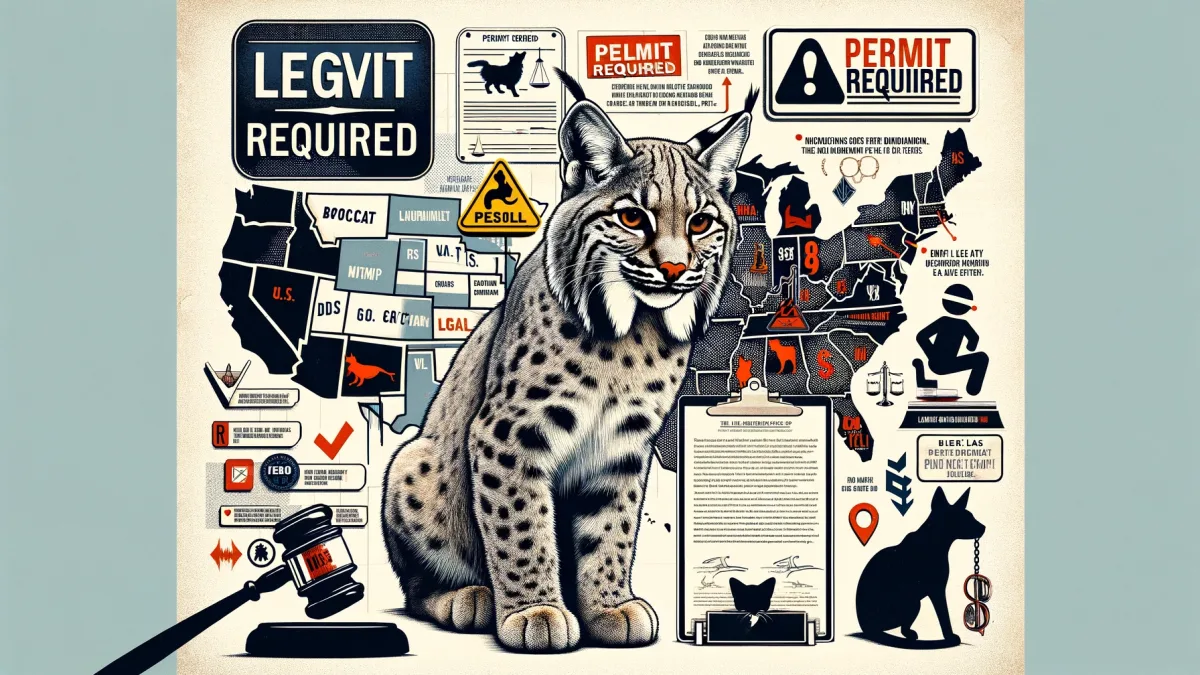The allure of owning an exotic pet like a bobcat is undeniable for some, conjuring images of a unique companionship that transcends the typical pet-owner relationship. However, the legal landscape in the United States regarding exotic pet ownership, particularly that of native wild species such as bobcats, is anything but straightforward. As an attorney with a focus on animal law, I’ve navigated the intricate web of regulations that govern the ownership of these majestic creatures. Here, I’ll shed light on the legalities, considerations, and responsibilities that come with the territory.
State-by-State Variance in Exotic Pet Laws
The first thing to understand about owning a bobcat in the U.S. is that legality varies significantly from one state to another. While some states have relatively lenient regulations, others impose strict bans or require a gamut of permits and conditions to be met.
States with Strict Regulations or Bans
Several states outright prohibit the ownership of bobcats as pets, classifying them under prohibited wildlife species. These bans are often in place to protect native wildlife populations and ensure public safety. States with strict exotic pet laws or bans typically include California, Georgia, and Hawaii, among others. In these locales, owning a bobcat could lead to legal repercussions, including fines and confiscation of the animal.
States Requiring Permits
Other states may allow the ownership of bobcats but require owners to obtain specific permits. These permits can include wildlife possession licenses, exotic pet permits, and sometimes proof of adequate facilities to house the animal. States like New York and Nevada fall into this category, where potential owners must navigate a bureaucratic process to legally own a bobcat.
Lax Regulation States
A handful of states have more lenient regulations regarding exotic pet ownership, requiring minimal to no permits for owning a bobcat. However, even in these states, local ordinances and regulations can impose additional restrictions, making it crucial for potential owners to research thoroughly before acquiring a bobcat.
Considerations Before Owning a Bobcat
Beyond the legal hurdles, owning a bobcat comes with a set of ethical and practical considerations.
Ethical Considerations
Bobcats are wild animals with inherent behaviors and needs that can be challenging to meet in a domestic setting. Prospective owners should consider whether they can provide an environment that respects the animal’s natural instincts and promotes its well-being.
Safety and Liability
Bobcats, even when raised in captivity, possess strong predatory instincts. Owners must consider the safety of their families, neighbors, and other pets. Additionally, owning a potentially dangerous animal can increase liability and require specialized insurance policies.
Veterinary Care
Access to veterinary care experienced in treating exotic animals is crucial. Bobcats require specialized diets and healthcare, which can be difficult and expensive to provide.
Legal Responsibilities of Bobcat Ownership
Owning a bobcat carries legal responsibilities that extend beyond initial permits and registrations. Owners must ensure their pets do not pose a threat to local wildlife or the community. Any incidents involving a bobcat, such as escapes or attacks, can result in legal action against the owner, including criminal charges in severe cases.
Wildlife Conservation Concerns
Potential owners should also consider the broader implications of exotic pet ownership on wildlife conservation. The demand for exotic pets can fuel illegal wildlife trade, contributing to the decline of wild populations.
Conclusion
While the idea of owning a bobcat may intrigue some, the legal, ethical, and practical realities present significant challenges. Laws regulating the ownership of bobcats in the U.S. are complex and vary widely by state, reflecting concerns for public safety, animal welfare, and wildlife conservation. Before embarking on the journey of exotic pet ownership, it’s crucial to conduct thorough research, consult with legal professionals specializing in animal law, and critically assess one’s ability to meet the needs of such a demanding companion. Owning a bobcat is not merely a statement of individuality—it’s a profound responsibility that should be approached with the utmost seriousness and consideration.









Leave a Reply